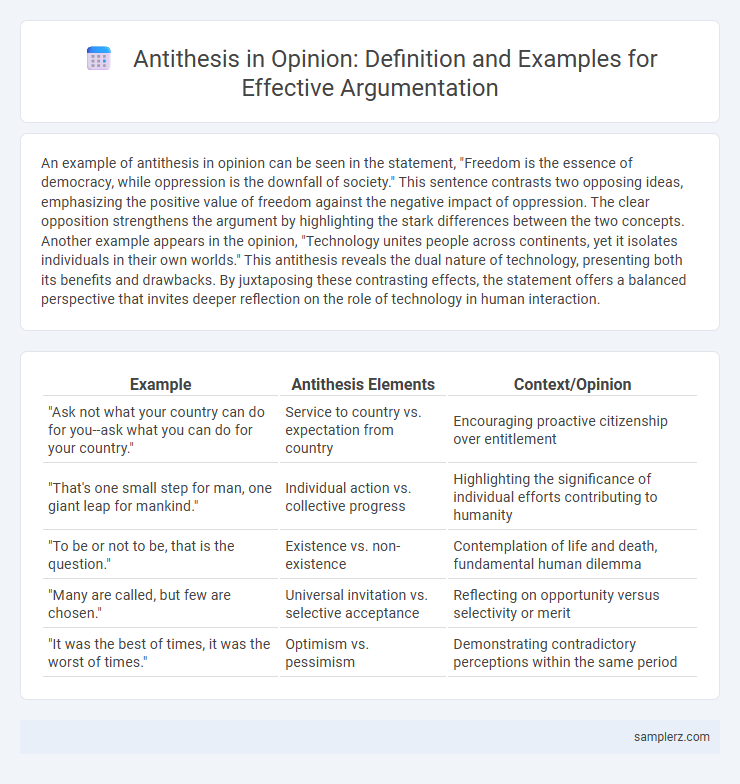An example of antithesis in opinion can be seen in the statement, "Freedom is the essence of democracy, while oppression is the downfall of society." This sentence contrasts two opposing ideas, emphasizing the positive value of freedom against the negative impact of oppression. The clear opposition strengthens the argument by highlighting the stark differences between the two concepts. Another example appears in the opinion, "Technology unites people across continents, yet it isolates individuals in their own worlds." This antithesis reveals the dual nature of technology, presenting both its benefits and drawbacks. By juxtaposing these contrasting effects, the statement offers a balanced perspective that invites deeper reflection on the role of technology in human interaction.
Table of Comparison
| Example | Antithesis Elements | Context/Opinion |
|---|---|---|
| "Ask not what your country can do for you--ask what you can do for your country." | Service to country vs. expectation from country | Encouraging proactive citizenship over entitlement |
| "That's one small step for man, one giant leap for mankind." | Individual action vs. collective progress | Highlighting the significance of individual efforts contributing to humanity |
| "To be or not to be, that is the question." | Existence vs. non-existence | Contemplation of life and death, fundamental human dilemma |
| "Many are called, but few are chosen." | Universal invitation vs. selective acceptance | Reflecting on opportunity versus selectivity or merit |
| "It was the best of times, it was the worst of times." | Optimism vs. pessimism | Demonstrating contradictory perceptions within the same period |
Defining Antithesis in Opinion Writing
Antithesis in opinion writing involves presenting contrasting ideas to highlight differences and strengthen arguments. By juxtaposing opposing viewpoints, writers clarify their stance and engage readers in critical thinking. This rhetorical strategy enhances the persuasiveness and clarity of opinions by emphasizing the contrast between conflicting ideas.
The Role of Contrast in Shaping Opinions
The role of contrast in shaping opinions is exemplified by the antithesis between freedom and control, where individuals weigh the value of personal autonomy against societal regulations. This opposition highlights how contrasting ideas clarify core beliefs, prompting deeper reflection and more defined viewpoints. Antithesis sharpens debate by presenting conflicting perspectives that challenge assumptions and encourage critical evaluation.
Antithesis as a Tool for Persuasion
Antithesis effectively highlights contrasting ideas, making opinions more persuasive by clearly defining opposing viewpoints. By juxtaposing concepts such as freedom and control or progress and tradition, speakers create memorable arguments that emphasize the stakes involved. This rhetorical device sharpens the message, compelling audiences to consider the balance between conflicting perspectives critically.
Classic Examples of Antithetical Statements
Classic examples of antithetical statements in opinion highlight the power of contrasting ideas to emphasize different perspectives, such as "Ask not what your country can do for you--ask what you can do for your country" by John F. Kennedy. These statements use direct opposition to create memorable and impactful messages that challenge conventional thinking. Antithesis enhances rhetorical effectiveness by clearly juxtaposing conflicting viewpoints or values within a single sentence or phrase.
Antithesis in Editorial Arguments
Antithesis in editorial arguments effectively highlights contrasting viewpoints, enhancing the clarity and impact of the opinion presented. By juxtaposing opposing ideas, such as "freedom versus regulation" or "progress against tradition," writers emphasize the stakes and deepen readers' understanding of the issue. This rhetorical technique sharpens the editor's argument, making the choice between competing perspectives more compelling and memorable.
Balancing Opposites: A Rhetorical Strategy
Balancing opposites as a rhetorical strategy involves presenting contrasting ideas to highlight differences and provoke thought, exemplified by statements like "Freedom is essential, yet order is indispensable." This technique sharpens the clarity of each viewpoint by juxtaposing them in a single opinion, enhancing persuasive impact. Effective use of antithesis in opinion engages audiences by creating a dynamic tension between conflicting concepts, encouraging deeper reflection.
Enhancing Clarity Through Antithesis
Antithesis enhances clarity in opinion by juxtaposing contrasting ideas, making arguments more compelling and easier to understand. For example, "Freedom is the right to act responsibly, not the license to harm," clearly delineates opposing concepts within a single statement. This technique sharpens the message, emphasizing key points and guiding readers through complex viewpoints.
The Impact of Antithesis on Reader Perception
Antithesis sharpens reader perception by juxtaposing opposing ideas, creating a clear contrast that highlights differences effectively. This rhetorical device enhances the clarity and memorability of opinions, making arguments more persuasive and impactful. Readers are drawn to the stark opposition, which deepens their engagement and prompts critical evaluation of the presented viewpoints.
Crafting Strong Opinions with Antithetical Reasoning
Crafting strong opinions through antithetical reasoning involves presenting two opposing ideas to highlight contrasts and deepen the argument's impact. By juxtaposing principles such as freedom versus control or innovation versus tradition, writers create compelling opinions that challenge audiences to reconsider their perspectives. This technique enhances clarity and persuasiveness in debates by underscoring the stakes involved in each position.
Antithesis in Modern Public Discourse
Antithesis in modern public discourse sharply contrasts opposing ideas to highlight conflicting perspectives, such as freedom versus security or individual rights versus collective responsibility. Political debates often employ antithesis to emphasize the divide between progressive change and conservative tradition. This rhetorical device enhances clarity and persuasion by framing complex issues in distinct, opposing terms.

example of antithesis in opinion Infographic
 samplerz.com
samplerz.com